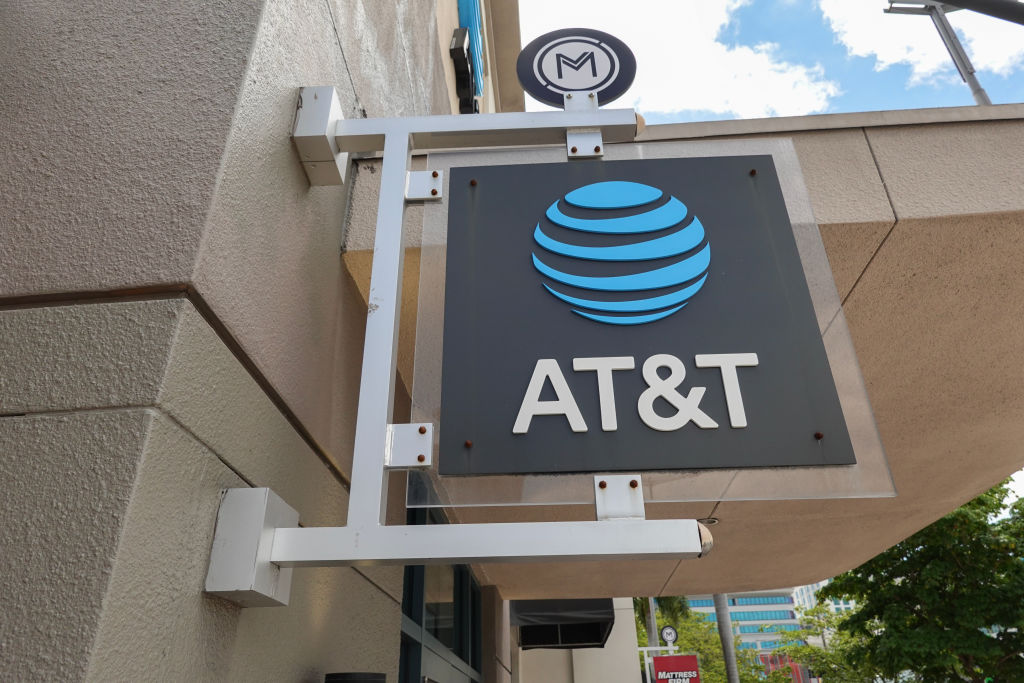AT&T Hack: What to Do If You're a Customer
A threat actor unlawfully accessed and copied AT&T call logs, the company said. Here's what you need to know.


Profit and prosper with the best of Kiplinger's advice on investing, taxes, retirement, personal finance and much more. Delivered daily. Enter your email in the box and click Sign Me Up.
You are now subscribed
Your newsletter sign-up was successful
Want to add more newsletters?

Delivered daily
Kiplinger Today
Profit and prosper with the best of Kiplinger's advice on investing, taxes, retirement, personal finance and much more delivered daily. Smart money moves start here.

Sent five days a week
Kiplinger A Step Ahead
Get practical help to make better financial decisions in your everyday life, from spending to savings on top deals.

Delivered daily
Kiplinger Closing Bell
Get today's biggest financial and investing headlines delivered to your inbox every day the U.S. stock market is open.

Sent twice a week
Kiplinger Adviser Intel
Financial pros across the country share best practices and fresh tactics to preserve and grow your wealth.

Delivered weekly
Kiplinger Tax Tips
Trim your federal and state tax bills with practical tax-planning and tax-cutting strategies.

Sent twice a week
Kiplinger Retirement Tips
Your twice-a-week guide to planning and enjoying a financially secure and richly rewarding retirement

Sent bimonthly.
Kiplinger Adviser Angle
Insights for advisers, wealth managers and other financial professionals.

Sent twice a week
Kiplinger Investing Weekly
Your twice-a-week roundup of promising stocks, funds, companies and industries you should consider, ones you should avoid, and why.

Sent weekly for six weeks
Kiplinger Invest for Retirement
Your step-by-step six-part series on how to invest for retirement, from devising a successful strategy to exactly which investments to choose.
AT&T hackers obtained data containing six months of call and text interactions of nearly all of its customers, the company said Friday.
The data obtained by the hackers included records of calls and texts between approximately May 1 and Oct. 31, 2022, and on Jan. 2, 2023, AT&T said in an SEC filing on Friday, where it added that it has closed off the access point the hackers used.
AT&T is working with law enforcement and at least one person has been apprehended, AT&T said. The Federal Communications Commission (FCC) is part of investigations, the commission confirmed.
From just $107.88 $24.99 for Kiplinger Personal Finance
Become a smarter, better informed investor. Subscribe from just $107.88 $24.99, plus get up to 4 Special Issues

Sign up for Kiplinger’s Free Newsletters
Profit and prosper with the best of expert advice on investing, taxes, retirement, personal finance and more - straight to your e-mail.
Profit and prosper with the best of expert advice - straight to your e-mail.
What to do if you're an AT&T customer
While a hack of this scale can sound alarming, there is some promising information and also some steps you can take.
First, it's important to note that AT&T said the hacked data does not include "content of calls or texts, personal information such as Social Security numbers, dates of birth, or other personally identifiable information."
Rather, the hacked data only includes "records of calls and text," but that does extend to "nearly all of AT&T's wireless customers." The company added that the hacked data doesn't include or link itself to customers' names, but names can be linked to telephone numbers through other research means.
If you are wondering if you were impacted, AT&T said it will provide notice to current and former customers, so you should keep an eye out for that. If you're a customer with questions, you can call AT&T wireless customer service at 1-800-331-0500.
Although personal information was not part of this hack, you may still be worried about your security. With that in mind, there are some steps you can take. For example, if you're an AT&T user, updating your passcode via the myAT&T Profile page is a way to protect your account.
You may also want to change the passwords on other key accounts, like with your banking and investing institutions or your email. This is a simple way to add a safety measure to your personal information, whether there was a recent hack or not. You can also use safe password managers, like 1Password, to build secure passwords for you.
After a hack disclosed in March, AT&T encouraged customers to monitor their account activity and credit reports, which is another smart move to protect yourself on a regular basis. At the time, AT&T recommended setting up free fraud alerts from credit bureaus Equifax, Experian and TransUnion. FreeCreditReport.com provides, as the URL suggests, free credit reports you can review.
Kiplinger experts also recommend seven smart moves to prevent identity theft, including securing your personal devices, safeguarding your Social Security number and using strong, diverse passwords.
More woes for AT&T users
AT&T previously disclosed a data breach in March following a release of customer data on the dark web in the weeks prior. AT&T determined the data was from 2019 or earlier and impacted 7.6 million current account holders and 65.4 million former account holders.
In that case, personal information of users, such as Social Security numbers, email addresses, mailing addresses, AT&T account numbers, phone numbers and more were obtained in the beach, AT&T said.
The company added that those impacted by the breach would be contacted by AT&T by mail or email and offer complimentary identity theft and credit monitoring services.
If you find yourself looking for a new wireless provider in the wake of these breaches, you can also reduce your monthly bill by selecting a smaller one. While there are some trade-offs by going smaller, Kiplinger contributor Ashlyn Brooks says these eight good value mobile companies are worth your consideration.
Related Content
- Riskiest Places to Give Your Social Security Number
- Where to Put Safe Money Today
- How Much Umbrella Insurance Do I Need?
Profit and prosper with the best of Kiplinger's advice on investing, taxes, retirement, personal finance and much more. Delivered daily. Enter your email in the box and click Sign Me Up.

Joey Solitro is a freelance financial journalist at Kiplinger with more than a decade of experience. A longtime equity analyst, Joey has covered a range of industries for media outlets including The Motley Fool, Seeking Alpha, Market Realist, and TipRanks. Joey holds a bachelor's degree in business administration.
-
 Ask the Tax Editor: Federal Income Tax Deductions
Ask the Tax Editor: Federal Income Tax DeductionsAsk the Editor In this week's Ask the Editor Q&A, Joy Taylor answers questions on federal income tax deductions
-
 States With No-Fault Car Insurance Laws (and How No-Fault Car Insurance Works)
States With No-Fault Car Insurance Laws (and How No-Fault Car Insurance Works)A breakdown of the confusing rules around no-fault car insurance in every state where it exists.
-
 Why Picking a Retirement Age Feels Impossible (and How to Finally Decide)
Why Picking a Retirement Age Feels Impossible (and How to Finally Decide)Struggling with picking a date? Experts explain how to get out of your head and retire on your own terms.
-
 How to Get the Fair Value for Your Shares When You Are in the Minority Vote on a Sale of Substantially All Corporate Assets
How to Get the Fair Value for Your Shares When You Are in the Minority Vote on a Sale of Substantially All Corporate AssetsWhen a sale of substantially all corporate assets is approved by majority vote, shareholders on the losing side of the vote should understand their rights.
-
 I Met With 100-Plus Advisers to Develop This Road Map for Adopting AI
I Met With 100-Plus Advisers to Develop This Road Map for Adopting AIFor financial advisers eager to embrace AI but unsure where to start, this road map will help you integrate the right tools and safeguards into your work.
-
 The Referral Revolution: How to Grow Your Business With Trust
The Referral Revolution: How to Grow Your Business With TrustYou can attract ideal clients by focusing on value and leveraging your current relationships to create a referral-based practice.
-
 The Key to a Successful Transition When Selling Your Business: Start the Process Sooner Than You Think You Need To
The Key to a Successful Transition When Selling Your Business: Start the Process Sooner Than You Think You Need ToWay before selling your business, you can align tax strategy, estate planning, family priorities and investment decisions to create flexibility.
-
 Have You Aligned Your Tax Strategy With These 5 OBBBA Changes?
Have You Aligned Your Tax Strategy With These 5 OBBBA Changes?Individuals and businesses should work closely with their financial advisers to refine tax strategies this season in light of these five OBBBA changes.
-
 What Will Happen to Your Business When You Retire? How to Exit Successfully and Thrive in Retirement
What Will Happen to Your Business When You Retire? How to Exit Successfully and Thrive in RetirementStepping away from work is extra challenging when you're a business owner, and a successful retirement requires planning that looks beyond the financials.
-
 Are Clients Asking About Adding Crypto to Their Retirement Plans? This Is How Advisers Can Approach This New 401(k) Frontier
Are Clients Asking About Adding Crypto to Their Retirement Plans? This Is How Advisers Can Approach This New 401(k) FrontierAdvisers need to establish clear frameworks to address client interest, navigate risks like volatility, and ensure they meet their fiduciary responsibilities.
-
 Private Equity Is Fundamentally Changing: What Now for Investors and Business Owners?
Private Equity Is Fundamentally Changing: What Now for Investors and Business Owners?For 40 years, private equity enjoyed extraordinary returns thanks to falling rates and abundant credit. That's changed. What should PE firms and clients do now?